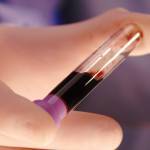What is Anemia in Horses?

Anemia in horses is characterized by a deficiency of red cells, hemoglobin, or total volume. Signs of anemia in horses may include poor performance, lack of energy, weakness, lethargy, loss of appetite, and depression.
Owners or trainers who see these signs in a horse may conclude that the animal is anemic and decide that more iron in the horse’s diet will fix the problem. At first glance, there is some merit to this idea because iron is an important element in hemoglobin, the component of the red blood cell that allows oxygen to be carried to the tissues. However, anemia caused by iron deficiency is actually quite rare in horses on normal diets. Anemia is particularly unusual in horses with access to pasture because the horse ingests some iron with the dirt that clings to forage.
A survey conducted at a California racetrack indicated that a large majority of trainers had their horses on some type of iron supplement. In this study, tests showed that horses receiving supplemental iron had iron levels that fell into the normal range for iron in adult horses, and very few of the horses examined had any evidence of anemia. Even those with resting hematocrits below 34% (defined as anemia) showed no evidence of impaired iron status. Horses with lowered hematocrits rarely respond to supplemental iron with a concomitant increase in hematocrit, so supplementing with iron is of questionable value when horses are not iron-deficient.
Cases of anemia do sometimes occur in horses. The most common cause of equine anemia is known as anemia of inflammation, which is a natural reaction of the body to hold onto its iron stores to help inhibit bacterial growth. For a horse with anemia, it is important to look for infections such as pneumonia or abscesses. Blood loss, such as fromgastric or colonic ulcers, can also cause anemia. Usually the blood protein in these horses is low as well. Other less common causes of anemia include equine infectious anemia (what the Coggins test detects), piroplasmosis, cancer, and autoimmune disease. Racehorses that have been given erythropoietin to boost red cell counts can develop a fatal anemia. Horses that are bleeders generally do not lose enough blood to become anemic.
If anemia is suspected in a horse, diagnosis should begin with a physical examination, a procedure that can often rule out possible causes. Several diagnostic tests can be used to help determine the cause of anemia. These include a complete blood count and other lab work, a Coggins test, and a bone marrow aspirate. Racehorse trainers may see a low result for the number of red blood cells in a complete blood count (RBC count) and equate these numbers with a low level of iron in the horse’s blood. However, this is not an accurate way to diagnose iron deficiency.
Iron appears to be efficiently absorbed at low levels of intake, and iron excretion in waste products is low. A significant aspect of iron metabolism deficiency anemia is the ability of the body to conserve iron. Approximately 67% of the iron in the body is contained in the red blood cells in the form of hemoglobin. Red blood cells are formed in a process known as erythropoiesis and remain in the circulation for about 150 days. When these red cells die, iron contained in the heme molecule is recycled and utilized to synthesize new heme molecules and red blood cells. As such, there is rarely a net loss of iron from the body.
There are a number of other common health conditions that can cause the same general signs—poor performance, lack of energy, weakness, lethargy, loss of appetite, and depression—as anemia. If owners or trainers see these signs in a horse, a veterinarian is the best source of advice to determine the horse’s status, cause of the problem, and treatment.








